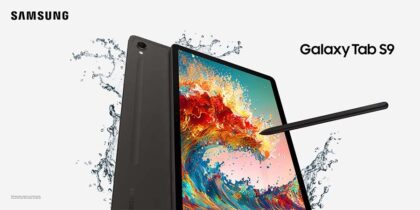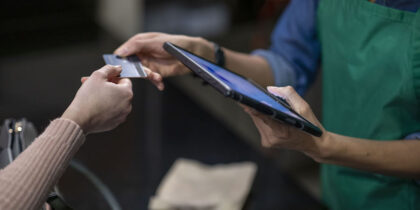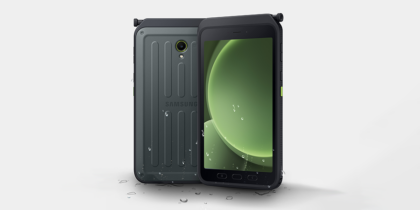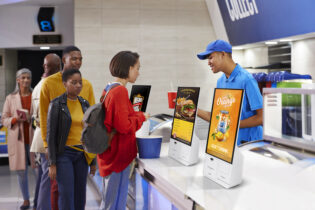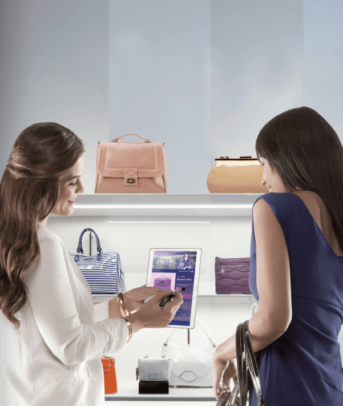Mobile POS — also called mPOS — is taking off. Research by IHL Group found that the overall installed base of mPOS devices rose 24.9 percent in 2017. That’s largely due to enterprise retailers catching on to what small and medium-sized business (SMB) retailers have already discovered: mPOS systems can be a game-changer in delivering a standout customer experience.
Today, mPOS applications in small businesses largely focus on replacing traditional, fixed POS units with next-gen mobile payment solutions. In the enterprise retail space, it’s proving an ideal way to supplement fixed-position POS by bringing mobile POS solutions to the customer. In fact, according to IHS, enterprise retailers adopting mobile POS are seeing sales growth 42 percent higher than those that do not use mPOS. The affordability of tablets like the Samsung Galaxy Tab S4 and smartphones like the Samsung J8 makes it easy for SMBs to capitalize on this level of growth.
Flipping the POS Script
The truth is, mPOS systems are a great fit for retailers of all sizes, because of their ability to flip the script. Instead of consumers approaching a counter and waiting in line for the retailer’s staff to serve them, mPOS can make it all about the customer. That ties right into consumers’ desire for more personalized, exceptional shopping experiences — especially for millennials. According to the National Retail Federation, “customers are most satisfied with technologies that streamline the store experience, from checking out to finding and picking up the items they need.” With over half citing mobile payment as one of these technologies.
Retailers who want to run mPOS and other applications from one versatile mobile device will appreciate the Galaxy Note9, which puts the power of a laptop in a retail-friendly form factor.
Create the Shopping Experience of the Future
This guide explains how IoT tools can close the gaps in your omnichannel retail strategy. Download Now
Some of the most effective uses for mPOS include:
- SMB POS: Traditional POS terminals are bulky, costly and mounted in one place. Mobile POS devices such as the Samsung Tab S4 are the opposite: they’re streamlined, low cost and flexible, so they can be placed in a mount on the counter and then picked up and carried in hand for use as mobile devices on the sales floor. This opens the door for a lot of SMB retailers who previously couldn’t afford POS — a surprising 64 percent of single-store retailers still don’t have a POS system in place, according to Gartner’s Software Advice site.
- Queue-Busting: Long lines drive away customers. Retailers who can complete transactions on the spot, or scan and suspend transactions for payment at the POS, save the sale and keep customers satisfied and coming back.
- Store-Within-a-Store: Leasing space within another store as a guest vendor can be a great way to test new markets or run limited-time events. Using mobile transaction solutions means easy set-up and take-down, without the need to run wiring or cabling.
- Clienteling: High-touch business models such as luxury apparel or furniture retailing depend on delivering an elevated customer experience. Mobile POS solutions enable retailers to bring the service to the customer. By sharing a tablet or smartphone, a store associate and customer can view purchase history, explore options and accessories, scroll through a lookbook, sign documents and complete the transaction, all on the spot. That’s the sort of convenience that increases conversions. An IHL webinar, “Why Updated POS is Critical for Unified Commerce,” reported that when a customer and associate share a mobile screen, it drives a 25 percent higher average ticket.
- Inventory Management: In off hours, mPOS devices can be used for inventory management, scheduling and other store management functions. Accessories such as barcode readers, sleds and receipt printers turn mobile devices into powerful retail store management tools.
Making mPOS Work
To optimize their chances of success, IHL and Stratix recommend retailers keep these strategies in mind:
- Ensure proper associate training on mobile device use (for example, not to lose eye contact)
- Create side-by-side transactions so customers can see what the associate is doing
- Use the mobile device to enhance the sales process, not just replace a stationary POS device
Mobile POS is the future of retail. While IHL Group found retail leaders are 150 percent more likely to be using mPOS than others, this technology truly levels the playing field. Streamlined, low-cost tablets and smartphones are well within the budgets of even the smallest retailer. That means SMB retailers can bring the power of mPOS wherever their customers want to be, creating the personalized brand experience that keeps customers coming back.
Technology is helping retailers change how consumers interact with businesses on a daily basis. Get a deeper look at innovations influencing this change.


